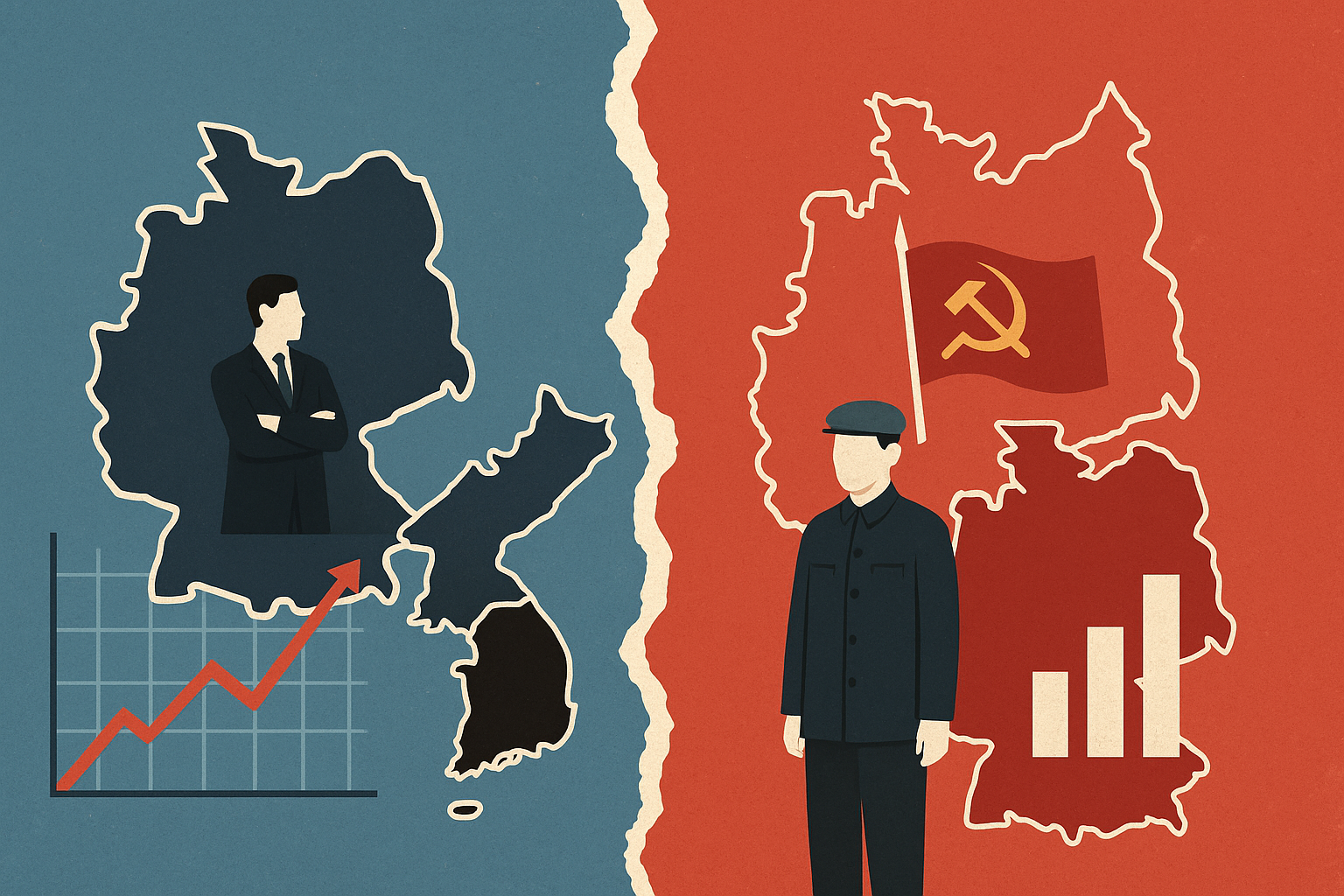Macroeconomics, the study of entire economies, faces a fundamental and dangerous dilemma: its theories govern the quality of life for every person on the planet, yet they can’t be tested in a sterile lab. You can’t simply run a control group on a country of millions to see if a policy works. The variables are nearly infinite, the human subjects are beautifully unpredictable, and the stakes are unimaginably high. A chemical experiment gone wrong might ruin a lab; an economic experiment gone wrong can destroy a nation, leading to famine and war.
So, since economists can’t create their own experiments, they must turn to the next best thing: history’s unwitting test subjects. By studying “economic twins”, nations with deep, underlying similarities that were torn apart by ideology and took drastically different paths, we can glean invaluable, real-world insights. The Cold War, for all its horrors, created the most famous of these natural laboratories: East and West Germany, and North and South Korea.
At first glance, the results seem brutally one-sided. In both cases, the capitalist, market-based twin flourished, while the centrally-planned communist state stagnated or collapsed. South Korea, once the poorer, less resource-rich half of the peninsula, now boasts a GDP per capita up to 30 times greater than the North. West Germany’s prosperity similarly dwarfed that of its eastern counterpart. For many, this is an open-and-shut case for free markets. But for a discerning economist, the interesting question isn’t who won, but why the outcome was so different.
The standard explanation points to the profit motive – that people work harder when they reap personal rewards. While partially true, this overlooks a far more profound factor: the economic calculation problem. A modern economy is a dizzyingly complex web of millions of goods, services, and individual desires. The foundational genius of a free market is that it outsources the monumental task of resource allocation. Every purchase you make is a tiny “vote,” signaling to producers what society values. No central committee decides how many avocados, iPhones, or indie video games to produce; the decentralized, collective wisdom of the market handles it.
A centrally planned economy, by contrast, must attempt this godlike task from the top down. As the Austrian economist Ludwig von Mises predicted just two years after the Russian Revolution, this is a fatal flaw. A central authority, no matter how brilliant or well-intentioned, simply cannot possess the omniscient insight required to direct millions of products to meet the nuanced demands of its people. This inevitably leads to misdirected resources, the Soviet Union’s infamous obsession with heavy industry at the expense of basic consumer goods, and chronic shortages of things people actually want.
However, the story isn’t without its twists. The market-based “wins” were aided by the Marshall Plan and billions in U.S. aid. More surprisingly, for the first few decades after their separation, North Korea’s economy, with its ability to make massive, decisive investments in industrialization, actually kept pace with the South. This highlights a key nuance: in the early, simpler stages of development, the brute force of central planning can be effective. It’s only when an economy becomes more complex that its lack of an accurate feedback mechanism becomes catastrophic.
But what happens when two nations both embrace markets but manage their wealth differently? For this, we turn to a less obvious set of twins: Norway and Venezuela. In the 1970s, both nations were rich in oil and established state-owned companies to harness that wealth. For a time, Venezuela was a stunning success, with a per capita output rivaling the United States. Yet today, it’s a humanitarian disaster, while Norway is arguably the most prosperous nation on Earth.
The difference lay in their foresight. Venezuela, eager to raise living standards, funneled its oil revenues directly into generous government spending. This created a sugar-rush economy, utterly dependent on high oil prices. When prices inevitably crashed, so did the country, leading to the political instability that plagues it to this day.
Norway, already a wealthier nation, chose a path of radical patience. Instead of spending the windfall, it invested the revenue into a sovereign wealth fund – essentially a national savings account. This fund acts as an economic shock absorber. The government’s budget is funded by the fund’s investment returns, not volatile oil prices. This masterstroke created economic and political stability, allowing other industries to thrive and ensuring sustained, long-term prosperity.
The ultimate lesson from these accidental experiments is that ideology is a poor substitute for pragmatism. The world’s most successful economies are not pure capitalist or communist utopias; they are messy, mixed systems. They harness the market’s dynamic power of allocation while using government intervention to correct its inherent flaws, like its failure to price negative externalities like pollution, and to provide for the long-term stability that allows a society to truly flourish. The goal is not to win a century-old debate, but to learn from history’s dramatic divergences and build economies that are not just rich, but resilient.
Read our full Report Disclaimer.
Report Disclaimer
This report is provided for informational purposes only and does not constitute financial, legal, or investment advice. The views expressed are those of Bretalon Ltd and are based on information believed to be reliable at the time of publication. Past performance is not indicative of future results. Recipients should conduct their own due diligence before making any decisions based on this material. For full terms, see our Report Disclaimer.

